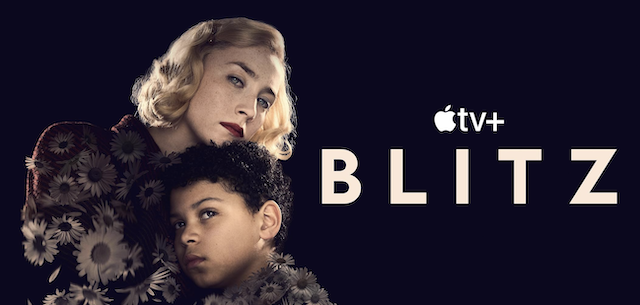
@Courtesy of Apple TV+
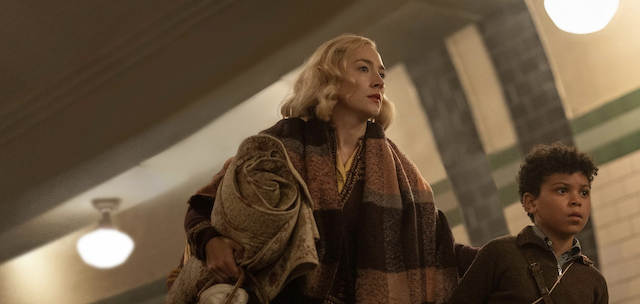
Q: How did you decide to focus telling the story on the civilians more than the soldiers that fought World War II?
Steve McQueen: It’s about the camaraderie, which I felt when I was in Iraq in 2003 with the troops coming from all over the UK. It was a very strange situation, what was interesting for me was that most of us only knew about the war through the media. It’s very abstract. It’s actually graphic. It’s on a computer screen, on a television, or on a printed newspaper. I wanted to bring it home as such, to bring the war to a certain point where we could get closer to it. One could do that through cinema. That was a starting point for the journey. Then I saw this photograph of this black kid being evacuated and I thought: that will be my end. I wanted to take it out of the abstract and into people’s hearts, if they could feel what war was.
Q: What did you want to make sure Saoirse Ronan and Elliot Heffernan knew about this period of time before starting the film?
Steve McQueen: It was about the nuances of ordinary life. Again, often how we see war films is about men in a field somewhere in France shooting each other. The pillars that kept the nation going. There were people who had to face the consequences of what was going on. It was about immersing them in this. They did their own research as well as me, we talked a lot about what was going on with people’s lives at that point.
Q: Can you talk about what made you take the role and what kind of research did you do in order to play Rita?
Saoirse Ronan: I wanted to get involved because of Steve. I was due to take a break from work, probably for a good six months. I said to my agent: “The only way I’ll come out of my planned semi-retirement is if someone like Steve McQueen gets in touch!” A few days later, we heard that he was going to make Blitz. I knew that there was going to be a unique perspective shown in the film, something that was fresh, more grounded in reality. We did a lot of research into the time period, but a lot of the character development came from the conversations that myself and Steve had during prep.
I built the dynamic between mother and child from my own relationship with my mom. I looked at a lot of footage of young women a few years after the war had finished, just speaking about their lives. I’ve found it very insightful watching people talk about the weather or what they do on a Saturday night or how they make their dresses or what they have for dinner. There’s something about the everydayness of that that made me feel more connected to the person that I was trying to embody.
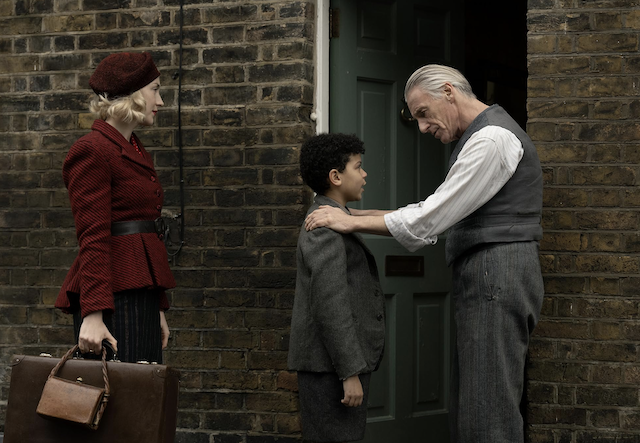
@Courtesy of Apple TV+
Q: What did you guys do together to build this family that we believe in so much before the action of the film starts?
Steve MCQueen: There was chemistry from day one. Saoirse took Elliot under a wing, that care was reciprocated through a friendship, an affection, and it grew and grew and grew. When Paul Weller came into the equation, he is a musician, he knows how to listen and give people space and interact. Paul is an extremely gentle and collaborative man. They loved being with each other, playing with each other. It’s just like if they were musicians. It was wonderful.
Saoirse Ronan: We got to record music that had been written for us at Abbey Road Studios, we got to work on these mini projects together during and before principal photography started. Paul was absolutely the master of it, he guided us and then he would step into our world. He was unbelievably humble and incredibly open to the whole experience. It really felt like we were partners in crime, Paul and I were aware that it was as important for us to create that for Elliot as it was for our characters to create that for George.
Q: How did you prepare for making a scene that complicated like the flood in the subway station?
Steve McQueen: I like to be loose. I like to be fluid. Once you’ve got this structure, once you’ve got the frame, there’s always a space to improvise. When you’re dealing with fast flowing water there’s nothing else you can do but wait for a thing to happen. I love being on my toes, that’s why it makes it exciting, because you’re not knowing exactly what’s going to happen but hopefully you capture it.
Q: How much did you know about the role that these women had to play at that time?
Saoirse Ronan: It was something that I hadn’t really taken the time to think about. As soon as you mention the word war, you instantly are transported to a male dominated environment. That’s usually where the drama is happening in film and TV. To take the time to really explore what working life was for women during that time gave it new importance for me. I come from a nation of very hardworking women. It was certainly an honour to have scenes with Hayley Squires and Erin Kellyman and Sally Messham, for us to actually be given time to explore what those dynamics were in a working environment.
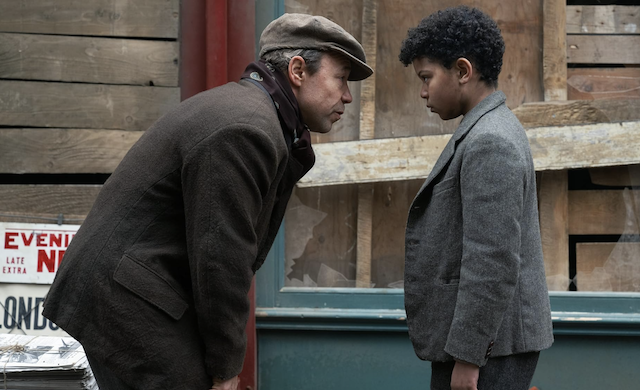
@Courtesy of Apple TV+
Q: Was there any unexpected or lighter moment during filming that provided balance to some of the heavier stuff you were dealing with?
Steve MCQueen: Too many. The dancing. It was marvelous, the band was playing and everyone just started dancing behind the camera, it was wonderful.
Saoirse Ronan: On film sets, especially when it’s a very serious subject matter, you need levity, you need to have moments where there’s lightness.
Q: You’ve done several challenging movies. How do you compare this with the difficulty level experienced in some previous roles?
Saoirse Ronan: – Each film is its own experience, its own education. What I have learned over the years is that you can’t go into anything assuming that you know how it’s all going to go, or what you’re going to get out of it. It will always surprise you in some way. Blitz wasn’t any different. There were challenges that I had never faced before, one of which being learning to sing and to perform in front of crowds, which was a very vulnerable position for me to be in. I mainly do independent films.
Being in a movie where the production is being supported financially so that we can achieve Steve’s vision, that was really incredible. It makes you appreciate the work when you have everything at your disposal so you can make it as amazing as it deserves to be.
Steve McQueen: I’ve been very lucky to work with great actors. What was interesting for me working with Saoirse was the level I would get so excited. Because you’re working with someone who has that concentration, you know when they’re in the zone, they’re ready to go. They have it, and that’s it, we move on. It’s beautiful. It’s a dance. It’s effortless. What we do is create an environment for her to do her genius. That’s beautiful when you see it. It really is gorgeous.
Q: What did you learn about motherhood from playing this role?
Saoirse Ronan: It’s never easy. When you have a kid, I’m sure it’s the same for a father as well, there will just always be a bit of you that is with them at all times, no matter what you’re doing or where you are in the world or how busy you are: there will always be this invisible tie to your child. That’s what I learned. But I also it was very important throughout us making Blitz, that there were still moments where we saw Rita just being Rita, where she isn’t just a mother. She is in the pub with her friends, she is putting on a brave face and she’s still a young woman. That was so important, to humanize her.
Steve McQueen: Unconditional love is the foundation of our movie. Without that foundation to put it on, we have no movie.
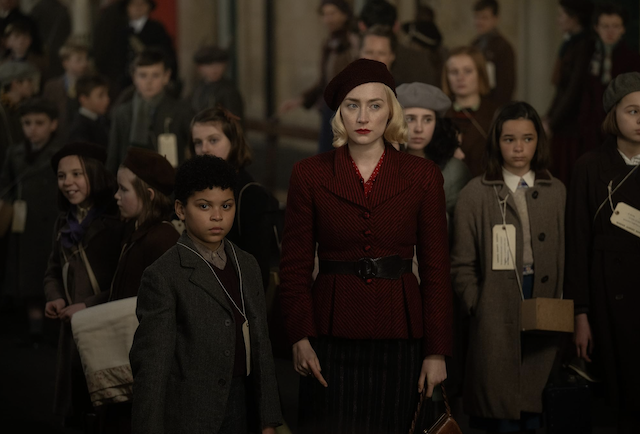
@Courtesy of Apple TV+
Check out more of Adriano’s articles.
Here’s the trailer of Blitz:

